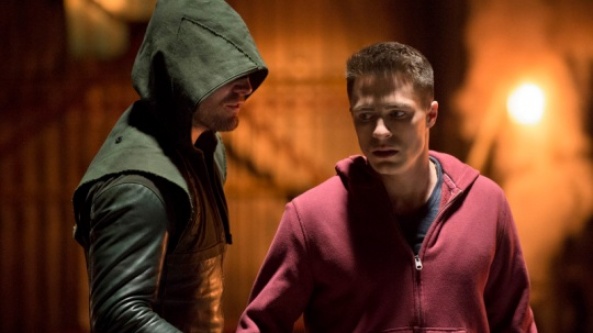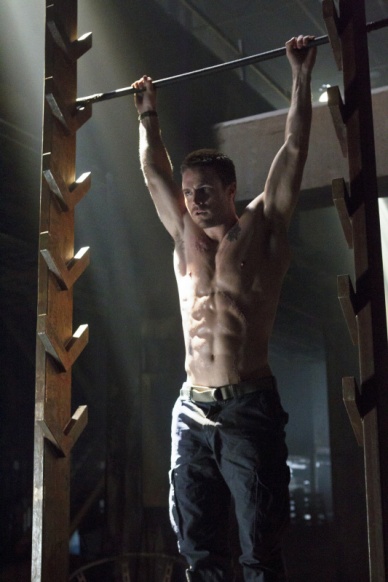Here’s an interesting bit of convergence that has happened recently.

In an interview with the Salt Lake Tribune (hat tip to Comics Alliance), actor Clark Gregg ruffled a few feathers by referring to people who gave up on his show Agents of SHIELD as — quote — “Those aren’t geeks. Those are losers.” SHIELD has been critically decimated by both fans and critics for a number of reasons, prominently being that the show just isn’t very good. Sure, a big aspect of it may be that it does not feel like a Marvel show, but the insistence that Gregg and the showrunners have that it’s going somewhere (“No, really, honest, we promise. Just keep watching. Hello?”) is doing little to assuage fans that the endeavor is in any way worthwhile. No, we’re all pretty content in saying “Please make better television if you’re going to drag it out.”
So I suppose it then goes without saying that people aren’t happy. Nobody likes being called a jerk by a guy whose current career is made by playing someone who is literally the definition of a fanboy (see: Coulson’s blood-stained Captain America trading cards), and insulting your exact target market is hardly the way to instill confidence. We may grow tired of hearing that it’s all leading to somewhere, which is great, OK, fine, whatever, but at least it’s not rude.
What makes this interesting, however, is that an interview with Stephen Amell, star of Arrow, appeared today at The Washington Post. And you know what it says?
Pretty much the exact opposite.

Instead of talking down to the audience for daring to expect at least slightly decent television, Amell praises the fans and their critical views of the show. When asked about why he thinks the show is becoming more successful his reply was, “The short answer is, I think they can tell we give a [expletive].” Which, in fairness, is true.
Amell then goes on to express adamant respect for the history of the character and his role in the medium, and assures us that the priority on the show is to get it right. Not only that, but Amell goes on still to say how important it is to connect with fans at a direct level (“I think that any actor that is not being active and sincere on social media is missing the boat. It’s not 1960. It’s not even 2010. It’s 2014, and you have to connect with the fans in a real way.”) and, in his own words:
The history of superhero shows on television is not rich with success. I want the show to go down, and be remembered, as maybe the show that changed momentum, that got it right. I want it to be the best superhero comic book show of all time. I want it to be at the top of the list.
If you can’t tell, I really like Stephen Amell.
So the gist of it is: Clark Gregg, star of SHIELD? Not a fan of the fans. Stephen Amell, star of Arrow? He loves you.
And that right there, to me, is the primary reason why it’s so intensely embarrassing about how much better Arrow is than SHIELD: because they give a [expletive].
Now, here’s the thing: that Salt Lake Tribune article is hardly what I would call fair. The quotes are taken out of context, there’s no way to tell if Gregg is speaking with malice or as a joke, and it’s full of the same generic copy/pasted platitudes we’ve seen a hundred thousand times from the people behind SHIELD. The problem I have with that piece is the same problem I have with SHIELD, in that it seems like someone has assumed there is a formula to how these things should go down and so everything is just put through a machine and repeated and repeated.
The interview with Amell, on the other hand, is actually an interview. They talk about the show, it’s past, present and future; it’s obviously a lot different. There’s clearly a bit more time and effort put into it, and I’d say it’s a decidedly better piece; at the very least, it’s very flattering to Amell, who certainly doesn’t need any more flattery.
Continued below
But in looking at the two, it’s impossible not to see that divide as clear: Arrow cares about its audience, SHIELD does not. SHIELD insists that what they are doing is in the right, that you need to give them your faith and love without their having to earn it; they know it’ll be worth it, why don’t you? It’s like a teacher who gets frustrated with you because you don’t understand what they’re trying to teach you — they already know how the formula works, so why don’t you get it what’s wrong with you are you stupid?
But Arrow seems to be aware of it’s growing and vocal audience and wants to appeal to them. It’s not necessarily done in that we are overlords they have to appease, but instead they are creating a show with an awareness that their primary audience is rather nitpicky and passionate about the source material. Their first season wasn’t great, but they’ve pulled out all the stops for the second season and are really ramping it upwards — and you can tell that it’s because they heard the complaints and have said, “OK, lets make this show better.” It’s that acknowledgement of faults instead of some kind of superiority complex that the audience is wrong.
Because for better or for worse, for every annoying boiler plate statement Marvel execs, producers and stars put out about how the show is building towards something big, it’s still patronizing — and incredibly so.
Of course, it’s also interesting to me because I find this kind of behavior is the exact opposite when it comes to Marvel and DC’s comics. In the comic world, DC very much spouts off the “just trust us!” mantra and shies away from engaging anyone who would tell them what they’re doing isn’t amazing; the New 52 is full of non-committal moves and then added bullshit about how they always meant to do X, Y or Z. Marvel, on the other hand, is happy to deal with their angry fans on the exact same level as they do their adamant ones; they have a recurring weekly forum hosted by CBR, and if you’ve ever been to a Marvel panel you’ll see how often they engage their angry fans head-on instead of taking away microphones.
Not only that, but up to this point everything about DC and Marvel in terms of their output were polar opposites. Marvel’s films are all celebrated down to loglines and announcements, whereas DC casts Ben Affleck and Jesse Eisenberg and can’t catch a break. Marvel repeatedly puts out books that challenge the audience and result in critical praise, whereas DC has decided to bring back “Secret Origins” to a chorus of, “Wait. What? Really?”
And, not for nothing, but the impression was always given that Marvel Studios really cared about “getting things right” while Warner Bros never particularly cared about superheroes and comic books as anything other than a potential source of revenue.

Marvel has dropped the ball in their television programming, and in an epic way at that. It’s incredibly embarrassing for a studio that has otherwise put out crowd-pleaser after crowd-pleaser. They may have a five-year plan in place that’ll blow my mind in 2018, but it’s a long road to that point; we don’t live in the future, we live in the now, and that’s the biggest thing the creators, producers et al of SHIELD need to understand.
So there you have it. You are free to read both articles and speculate on the whys of it all and form your own opinions from there. Honestly, if I had to guess, I would think that the SHIELD producers and the folks at Marvel Studios figured they could coast on the success of their film line without really worrying about adapting to a completely different medium. Warner Bros television department has been down this road before with ten seasons of Smallville, let alone other successful shows like Chuck or Supernatural. Television is a learning curve, especially in an era where we have Game of Thrones and Breaking Bad and everything is sunny all the time always, and it’s highly possible that by season 2, SHIELD could smarten up and overtake Arrow season 3. It’s highly possible.
Continued belowBut for now, I’ll continue to wish that I wrote the write-ups on Arrow instead of Brian.

But, hey, maybe we’re all wrong. Perhaps Gregg is just jealous of Amell’s abs? They go on for, like, forever. It’s like he’s photoshopped.



